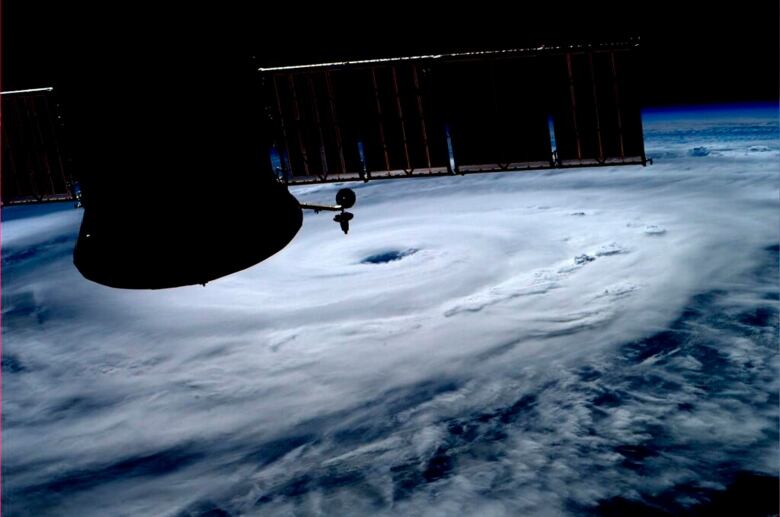Hurricane Arthur makes landfall in U.S.
Arthur, the 1st hurricane of 2014 season, will likely reach Atlantic Canada as tropical storm
The centre of Hurricane Arthur is moving near North Carolina's coast early Friday after slashing into the state's barrier islands just ahead of Independence Day, forcing thousands to flee and much of the East Coast to shuffle holiday celebrations.
Arthur strengthened to a Category 2 storm with sustained winds of 120 kilometres per hour Thursday evening before passing over the southern end of the Outer Banks — a 200-mile string of narrow barrier islands with about 57,000 permanent residents. The islands are susceptible to high winds, rough seas and road-clogging sands, prompting an exodus that began Wednesday night.
- See pictures of Hurricane Arthur taken from the International Space Station
- How does a hurricane get its name?
- The power and fury of tropical storms
- Tropical cyclones are expanding their path of destruction
The storm turned slightly west late Thursday, increasing the threat to mainland communities.
Storm-tracking models show Arthur moving up the U.S. east coast toward Atlantic Canada throughout the day Friday.
Canadian Hurricane Centre meteorologist Bob Robichaud said he expects Arthur to weaken as it moves north and become a strong post-tropical storm with sustained winds of 65 km/h or more when it arrives late Friday or early Saturday.
"We're still looking right now at a tropical storm arriving, but very, very close to hurricane strength," he said.
"So yes, this is something we're watching quite closely."
Robichaud said the storm is also expected to pack plenty of rain, including a possible 100 millimetres in parts of New Brunswick.
"In terms of the worst wind, it looks like Nova Scotia and in terms of the worst rain it looks like New Brunswick," he said.
The looming storm has also cancelled several weekend events, including the Stan Rogers Folk Festival in Canso, N.S., which was set to begin on Friday and run throughout the weekend.Residents on the south coast of Nova Scotia are being told to brace for 90 km/h rain gusts and local flooding.
"It is impossible in these circumstances for us to guarantee public safety," Troy Greencorn, the festival's artistic director, said in a statement. "It's a horrible decision to have to make after so much work by so many people, but we just aren't prepared to take the risks.… Hosting an outdoor, camping festival in a hurricane would be foolhardy."
CBC meteorologist Ian Black said the weekend weather will be "nasty," but it could have been much worse.
"The good news is that the warm waters that help feed this hurricane and intensify it into a Category 2, those warm waters get really cold once you get close to Canada," Black said. "That's not going to support a hurricane, so that hurricane's going to weaken as it slams through here."
Hurricane forces evacuations in North Carolina
The U.S. National Hurricane Center predicted Arthur would swipe the coast early Friday with winds of up to 136 km/h, with North Carolina set to take Hurricane Arthur's biggest punch.
Outer Banks residents and out-of-town visitors who fail to evacuate ahead of the hurricane's expected arrival should prepare for possibly getting stuck for several days without food, water or power, U.S. National Hurricane Center forecaster Stacy Stewart said Thursday.

Other areas of the Outer Banks were taking a cautious yet optimistic approach: No evacuations had been ordered for areas north of Hatteras, including the popular town of Kill Devil Hills, which was the site of the Wright brothers' first controlled, powered airplane flights in 1903.
The holiday weekend was not expected to be a complete loss for the estimated quarter-million visitors vacationing on the Outer Banks. Forecasters said the storm would move through quickly with the worst of the weather near Cape Hatteras about dawn Friday. Then it was expected to clear.
Boston Pops concert moved up a day
Up north in Boston, one of America's signature Fourth of July events, the annual Boston Pops outdoor concert and fireworks show, was moved up a day because of potential heavy rain ahead of the hurricane.

The performance takes place along the Charles River Esplanade, with fireworks set off from barges on the river. Hundreds of thousands of people usually attend. Organizers and public safety officials said the celebration was rescheduled for Thursday, which appeared to be the best of two potential bad weather days.
Arthur, the first named storm of the Atlantic season, prompted a hurricane warning for much of the North Carolina coast. Tropical storm warnings were in effect for coastal areas in South Carolina and Virginia.
Forecasters expect Arthur to whip past the North Carolina's Outer Banks islands on Friday without making landfall, but Gov. Pat McCrory warned vacationers along the coast not to risk their safety by trying to salvage their picnics, barbecues and pre-paid beach cottage vacations.
"Don't put your stupid hat on," McCrory said.
With files from CBC News and The Canadian Press
